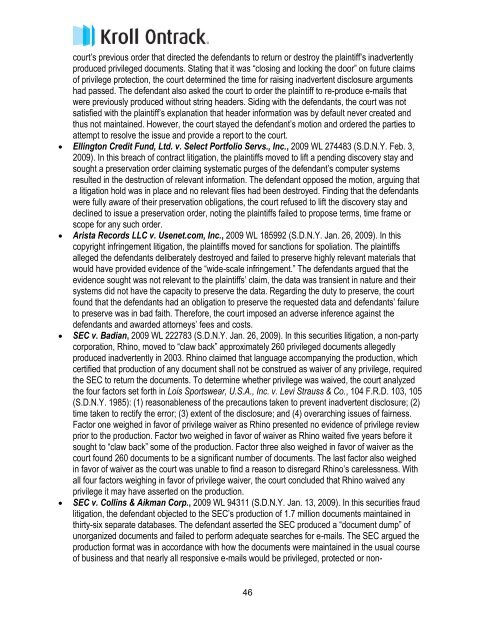Electronic Discovery and Computer Forensics Case List - Kroll Ontrack
Electronic Discovery and Computer Forensics Case List - Kroll Ontrack
Electronic Discovery and Computer Forensics Case List - Kroll Ontrack
You also want an ePaper? Increase the reach of your titles
YUMPU automatically turns print PDFs into web optimized ePapers that Google loves.
court’s previous order that directed the defendants to return or destroy the plaintiff’s inadvertently<br />
produced privileged documents. Stating that it was “closing <strong>and</strong> locking the door” on future claims<br />
of privilege protection, the court determined the time for raising inadvertent disclosure arguments<br />
had passed. The defendant also asked the court to order the plaintiff to re-produce e-mails that<br />
were previously produced without string headers. Siding with the defendants, the court was not<br />
satisfied with the plaintiff’s explanation that header information was by default never created <strong>and</strong><br />
thus not maintained. However, the court stayed the defendant’s motion <strong>and</strong> ordered the parties to<br />
attempt to resolve the issue <strong>and</strong> provide a report to the court.<br />
� Ellington Credit Fund, Ltd. v. Select Portfolio Servs., Inc., 2009 WL 274483 (S.D.N.Y. Feb. 3,<br />
2009). In this breach of contract litigation, the plaintiffs moved to lift a pending discovery stay <strong>and</strong><br />
sought a preservation order claiming systematic purges of the defendant’s computer systems<br />
resulted in the destruction of relevant information. The defendant opposed the motion, arguing that<br />
a litigation hold was in place <strong>and</strong> no relevant files had been destroyed. Finding that the defendants<br />
were fully aware of their preservation obligations, the court refused to lift the discovery stay <strong>and</strong><br />
declined to issue a preservation order, noting the plaintiffs failed to propose terms, time frame or<br />
scope for any such order.<br />
� Arista Records LLC v. Usenet.com, Inc., 2009 WL 185992 (S.D.N.Y. Jan. 26, 2009). In this<br />
copyright infringement litigation, the plaintiffs moved for sanctions for spoliation. The plaintiffs<br />
alleged the defendants deliberately destroyed <strong>and</strong> failed to preserve highly relevant materials that<br />
would have provided evidence of the “wide-scale infringement.” The defendants argued that the<br />
evidence sought was not relevant to the plaintiffs’ claim, the data was transient in nature <strong>and</strong> their<br />
systems did not have the capacity to preserve the data. Regarding the duty to preserve, the court<br />
found that the defendants had an obligation to preserve the requested data <strong>and</strong> defendants’ failure<br />
to preserve was in bad faith. Therefore, the court imposed an adverse inference against the<br />
defendants <strong>and</strong> awarded attorneys’ fees <strong>and</strong> costs.<br />
� SEC v. Badian, 2009 WL 222783 (S.D.N.Y. Jan. 26, 2009). In this securities litigation, a non-party<br />
corporation, Rhino, moved to “claw back” approximately 260 privileged documents allegedly<br />
produced inadvertently in 2003. Rhino claimed that language accompanying the production, which<br />
certified that production of any document shall not be construed as waiver of any privilege, required<br />
the SEC to return the documents. To determine whether privilege was waived, the court analyzed<br />
the four factors set forth in Lois Sportswear, U.S.A., Inc. v. Levi Strauss & Co., 104 F.R.D. 103, 105<br />
(S.D.N.Y. 1985): (1) reasonableness of the precautions taken to prevent inadvertent disclosure; (2)<br />
time taken to rectify the error; (3) extent of the disclosure; <strong>and</strong> (4) overarching issues of fairness.<br />
Factor one weighed in favor of privilege waiver as Rhino presented no evidence of privilege review<br />
prior to the production. Factor two weighed in favor of waiver as Rhino waited five years before it<br />
sought to “claw back” some of the production. Factor three also weighed in favor of waiver as the<br />
court found 260 documents to be a significant number of documents. The last factor also weighed<br />
in favor of waiver as the court was unable to find a reason to disregard Rhino’s carelessness. With<br />
all four factors weighing in favor of privilege waiver, the court concluded that Rhino waived any<br />
privilege it may have asserted on the production.<br />
� SEC v. Collins & Aikman Corp., 2009 WL 94311 (S.D.N.Y. Jan. 13, 2009). In this securities fraud<br />
litigation, the defendant objected to the SEC’s production of 1.7 million documents maintained in<br />
thirty-six separate databases. The defendant asserted the SEC produced a “document dump” of<br />
unorganized documents <strong>and</strong> failed to perform adequate searches for e-mails. The SEC argued the<br />
production format was in accordance with how the documents were maintained in the usual course<br />
of business <strong>and</strong> that nearly all responsive e-mails would be privileged, protected or non-<br />
46

















